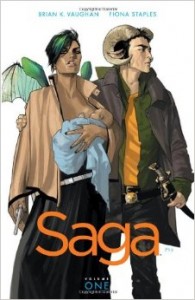 Brian K. Vaughan and Fiona Staples sci-fi epic adventure, Saga, quickly emerged as a genre redefining, bestselling addition to the comic book cannon. It rapidly picked up a shelf-full of awards from the Eisner’s, Harvey’s, Hugo’s, and even a British Fantasy Award for Best Comic/Graphic Novel. Since its debut in March 2012, this critically acclaimed comic series also become one of the most controversial comics, holding the sixth spot on the ALA’s 2014 Top Ten List of Frequently Challenged Books.
Brian K. Vaughan and Fiona Staples sci-fi epic adventure, Saga, quickly emerged as a genre redefining, bestselling addition to the comic book cannon. It rapidly picked up a shelf-full of awards from the Eisner’s, Harvey’s, Hugo’s, and even a British Fantasy Award for Best Comic/Graphic Novel. Since its debut in March 2012, this critically acclaimed comic series also become one of the most controversial comics, holding the sixth spot on the ALA’s 2014 Top Ten List of Frequently Challenged Books.
Saga, regularly compared to sci-fi/space opera epic, Star Wars, really begins more akin to Romeo and Juliet. Would be star-crossed lovers, Alana and Marko, the series’ leads, are from warring lands and their love, as well as their daughter Hazel, flies in the face of propaganda spewed by both sides of the conflict. Instead of allowing external struggles to destroy them, ala Shakespeare’s teen romance, Alan and Marko set off together, chased by groups from both sides, and what transpires is a funny, remarkably authentic, family story.
Just from the first volume’s cover, readers can see the protagonists are from different worlds, in this case literally, but it also offers metaphoric implications. Alana’s green wings verses Marko’s ram like horns, for the detail oriented, the type of weapon each chooses speaks to their background. once a readers falls into the witty dialogue and beautifully rendered panels, it becomes even clearer that this story can speak to any type of family, making at an important resource in a genre often criticized for lack of inclusion.
In 2013, Saga #12 was temporarily made unavailable in the Apple App Store due to a misinterpretation on comiXology’s part of Apple’s content policies — policies that in the same year led to the censorship of several other comics, specifically those from French publisher and distributor, Izneo. As this wasn’t the first time comics seemed to be exclusively excluded from the Apple store and with Saga’s popularity, news quickly escalated to accusations of censorship brought about by a supposed homophobic reaction of the certain images in the issue. The exclusion of the issue also led to Saga creator Brian K. Vaughan making a distressed public statement, letting fans know that he, Fiona Staples, and Image Comics stood behind the book in the face of what initially looked like censorship.
What made this case particularly complicated is the fact that Apple as a private enterprise reserves the right to regulate and exclude any content that they deem inappropriate for their store. Included in Apple’s content policy is a line which reads, “We will reject Apps for any content or behavior that we believe is over the line.” The vagueness of this statement is ultimately what led to the real reason that Saga #12 didn’t make it initially to the Apple app store — comiXology’s mistaken belief that the book would not be allowed under a vaguely-worded and inconsistently enforced content policy.
In a public statement released a week after the controversy, comiXology revealed that it was not Apple who made the call to not sell Saga #12, but rather a misinterpretation of Apple’s policy that urged comiXology. As comiXology CEO David Steinberger wrote:
As a partner of Apple, we have an obligation to respect its policies for apps and the books offered in apps. Based on our understanding of those policies, we believed that Saga #12 could not be made available in our app, and so we did not release it today.
We did not interpret the content in question as involving any particular sexual orientation, and frankly that would have been a completely irrelevant consideration under any circumstance…
After hearing from Apple this morning, we can say that our interpretation of its policies was mistaken. You’ll be glad to know that Saga #12 will be available on our App Store app soon.
Although the removal of Saga #12 was temporary, the circumstances surrounding the case, including Apple’s vague and subjective content policy, lend themselves to a much larger and more frightening issue: To what extent does one need to self-censor in order to make their books available on digital platforms?
Saga was listed as one of the ten most challenged books in 2014 by ALA due to a challenge submitted to an undisclosed Oregon public library, petitioning for the removal of Saga Vol. 1 over sexually explicit content — content that the complainant perceived to be age-inappropriate and propagating anti-family values. Few public details were available about the challenge, but the Oregon Intellectual Freedom Clearinghouse 2014 Annual Report revealed that the library opted to keep Saga on its shelves.
